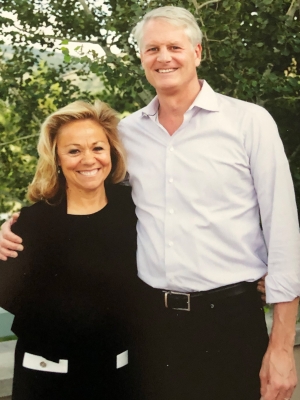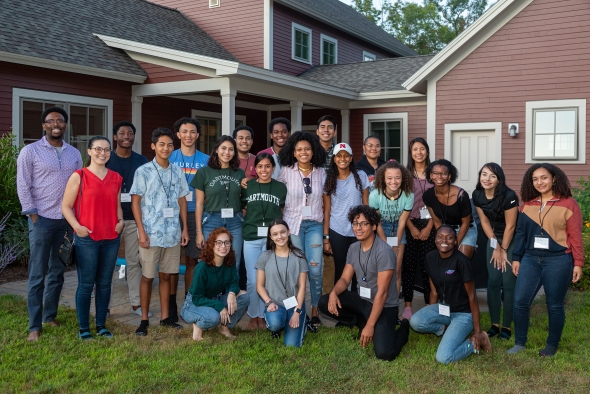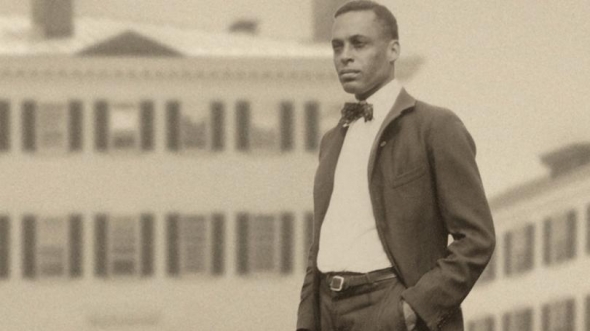$20 Million Gift Addresses National STEM Diversity Gap
Posted on May 16, 2021 by Office of Communications
Gift from Dartmouth alumni seeds a $60 million investment plan for DEI initiatives.
Dartmouth today announced a gift of $20 million from Eileen Chamberlain Donahoe '81 and John Donahoe '82 to enhance the representation, success, and leadership of historically underrepresented groups in science, technology, engineering, and mathematics (STEM) nationally.
Their gift honors the legacy of Dartmouth alumnus E.E. Just, the African American scientific trailblazer and valedictorian of the Class of 1907, and is a key component of a $60 million investment Dartmouth is making in diversity, equity, and inclusion (DEI) initiatives across the institution.
President Philip J. Hanlon '77 announced the Donahoe gift at the 222nd meeting of the Dartmouth Alumni Council held virtually this past Friday.
"Talent is equally distributed, even if opportunity is not," said President Hanlon. "Through this extraordinary gift, Dartmouth will pursue programs that help create a racially and ethnically diverse talent pipeline for the next generation of engineers, doctors, computer scientists, and the professors who will teach them. Eileen and John believe that Dartmouth can lead on this national issue and they are generously giving us the means to expand these proven programs."
The Donahoes are the first couple to have each served on Dartmouth's Board of Trustees. Eileen is a current member of the board and John served from 2003-2012. Eileen is executive director of the Global Digital Policy Incubator at Stanford University and has served as a U.S. ambassador to the United Nations Human Rights Council. John is the CEO of Nike, and has been CEO of eBay, PayPal, and a worldwide managing director at Bain & Co.

The Donahoes have four children, three of whom graduated from Dartmouth: Jack, Thomas '09, Catherine '15, and Kevin '17. Eileen and John credit Dartmouth as the place where they learned to work alongside, and lead, diverse groups of people—a legacy that has enriched and informed their careers and volunteer service.
"Our Dartmouth experience had a profound impact on our lives, including teaching us the importance of diversity and inclusion," says John Donahoe. "We are honored to help support future generations of Dartmouth students from historically underrepresented groups."
"This year has served as a wake-up call for America on race," says Eileen Donahoe. "It was a year when we were forced to recognize the inadequacy of our own understanding of racial justice in the United States. We wanted to do something about the race issues we face in America."
"We are thrilled to include news of the Donahoe's gift in the announcement of this new set of initiatives. Eileen and John's commitment to addressing racial and economic inequality is matched by the generosity of their gift, benefiting Dartmouth and the world, for generations to come," says Laurel Richie '81, chair of the Dartmouth Board of Trustees.
Increasing the Success Rate of Faculty and Students in STEM
The Donahoe gift will establish a new faculty fellowship to create a cohort of six early-career faculty members in the STEM disciplines, with one fellow appointed each year for six years. The gift will support faculty recruiting and retention efforts in the Faculty of Arts and Sciences, the Geisel School of Medicine, and Thayer School of Engineering.
Creation of the fellowship formalizes a pilot program that Dartmouth undertook in 2015 as one of three U.S. universities to receive a Mellon Planning Grant for building faculty diversity and inclusion from The Andrew W. Mellon Foundation.
The Donahoe gift will also endow and further expand the E. E. Just Program, which began with a professorship in Just's name in 1981 and was enhanced and expanded in 2014. The program seeks to increase the number of historically underrepresented students pursuing degrees and careers in STEM fields by creating pathways to ensure their success through opportunities for intellectual engagement, professional growth, and mentorship. The gift will expand three core areas critical to student achievement in STEM: mentorship and networking, academic enrichment programs, and undergraduate internship and research opportunities.
The E.E. Just Program has had a dramatic impact on the recruitment and retention of underrepresented students in STEM studies. Since the launch of the program, the graduation rate of students who participate is twice that of students who do not.

"I'm deeply grateful to Eileen and John for their extraordinary gift to support diversity and equity in the Dartmouth community and particularly in STEM fields," says Dean of the Faculty of Arts and Sciences Elizabeth Smith. "As a scientist who believes in the power of diverse backgrounds and perspectives to drive discovery, I am especially grateful to the Donahoes for championing the E.E. Just Program, which had been one of my top priorities as associate dean for the sciences and now as dean of the faculty."
E. E. Just Program Director Craig Sutton says, "With this generous gift, the E.E. Just Program is transformed into an enduring force of change, positioning Dartmouth to become a nationally recognized destination for underrepresented minorities interested in STEM. For generations to come, the program will illuminate pathways to success as it continues to drive the fundamental change needed to create a truly diverse and inclusive STEM ecosystem at Dartmouth and beyond."
The Donahoe gift also provides academic enrichment funds and scholarship support to promote access and affordability.
E. E. Just, a Dartmouth Alumnus and Iconic Scientist
By endowing the E.E. Just Program and establishing a faculty fellowship in his name, the Donahoes give prominence to the alumnus and valedictorian of his class. Just was an academic powerhouse who overcame poverty and discrimination to become an innovative scientist, science author, and educator. Much of his groundbreaking research took place in Europe, due to limited opportunity in the United States for Black scholars and scientists. Unrecognized by much of academia in his lifetime, he has become an inspiring example of international achievement in the face of cultural adversity.

"We want every potential applicant, especially young people of color who have a passion for STEM, to know that Dartmouth is a place that is committed to Dr. Just's scientific legacy so that they can thrive," Eileen Donahoe says.
According to the National Science Foundation's National Center for Science and Engineering Statistics 2018 report, the share of science and engineering degrees awarded to Hispanics, Latinos, Blacks, American Indians, and Alaska Natives continue to be underrepresented relative to their representation—33%—in the U.S. population. These groups received 24% of all science and engineering bachelor's degrees awarded to U.S. citizens and permanent residents, 22% of master's degrees, and more than 13% of doctoral degrees, the NSF report says.
The disparities extend beyond degrees: According to John Rich '80, professor at the Drexel University School of Public Health and 2006 MacArthur Foundation Fellow, the underrepresentation of scholars and teachers in STEM who are Black, Indigenous, and other people of color (BIPOC) has far-reaching implications for the private sector, public policy, and academia.
"Without BIPOC teachers and faculty, students of color don't have access to mentorship or inspiration to believe that they can succeed in these fields," says Rich. "Add to this the financial barriers posed by centuries of systemic racism and the deck is further stacked against potential scientists, engineers, and physicians of color. Furthermore, the lack of physicians of color has a direct effect on worsening racial and ethnic disparities in health care, which literally costs communities lives."
A Robust New Phase: $60 Million in Campaign Initiatives Toward Diversity and Inclusion
The Donahoe gift announcement was the culmination of an Alumni Council meeting at which Hanlon introduced Shontay Delalue, Dartmouth's inaugural senior vice president/senior diversity officer, and announced the $60 million investment plan within The Call to Lead campaign to realize a suite of strategic initiatives.
"This is an exciting time at Dartmouth," said Delalue. "I look forward to leading diversity, equity and inclusion efforts at the institution and ensuring that this investment plan is connected to a strategy that will allow us to work on a set of goals that can transform Dartmouth."
Six connected initiatives will enable Dartmouth to become a more diverse, equitable, and inclusive campus through increased faculty diversity, student support, and community building efforts. Individually and together, these initiatives introduce a system of supportive endeavors that are expected to drive current and future outcomes to ensure all members of the Dartmouth community feel a sense of belonging. The initiatives are:
- Recruit Early-Career Faculty to Enhance Diversity, Equity, and Inclusion: An early-career faculty fellowship program will support an 18-member faculty cohort in their teaching and scholarship.
- Develop a Pipeline of Future BIPOC Leaders in STEM fields: A best-in-class, nationally recognized enrichment program and an endowed scholarship fund aimed at increasing the number of BIPOC students in STEM disciplines.
- Create a Diversity, Equity, and Inclusion Accelerator Fund: Empower and activate community-based strategies to improve campus climate and expedite innovative seed funding in the next one to two years.
- Foster an Intellectual Hub for Black Scholars: Establish a pilot program for a potential institute for Black intellectual and cultural life to foster dialogue and community for all students, faculty, and staff.
- Launch the Tribal Services and Solutions Project: Establish a pilot program for a potential institute to forge new collaborations between Dartmouth and Native American communities to address inequities in public health, economic development, and land rights.
- Increase Faculty Teaching and Research on Racial Injustice: Build endowed resources for Dartmouth's African and African American Studies program—among the oldest of its kind in the nation—as well as research and teaching focusing on race, ethnicity, and migration.
Matt Delmont, the Sherman Fairchild Distinguished Professor of History and special advisor to Hanlon on faculty diversity for the current academic year, said the initiatives are the result of dozens of conversations with faculty, staff, students, trustees, and alumni.
"We selected these particular ideas because they speak to Dartmouth's unique strengths and opportunities. Support for these initiatives will benefit the entire campus community and distinguish Dartmouth among our peers," he said.
The new initiatives represent the next phase of DEI efforts introduced under Hanlon's leadership. Since his address to the faculty in November 2013, the president has promoted the integration of diversity, equity, and inclusion as an integral part of Dartmouth's core missions of teaching and research.
A series of comprehensive initiatives has introduced practical, concrete actions to recruit and retain underrepresented faculty, improve the student social experience, and build community among BIPOC staff. Significant institutional investment has supported those initiatives, with additional resources focused on growing faculty diversity.
Dartmouth will also invest in the Office of Institutional Diversity and Equity to expand its personnel and programmatic impact and elevate its reporting line to the Office of the President. Together, these commitments aim to improve Dartmouth's cultural climate by increasing the percentage of faculty from underrepresented groups from 20% in 2021 to 25% or more by 2027 and establishing enduring programs that foster a welcoming atmosphere and a sense of belonging for all.
These initiatives are part of Dartmouth's $3 billion The Call to Lead campaign to prepare a new generation of Dartmouth graduates for lives of leadership and impact. Generous financial support from more than 50,000 alumni, parents and friends has produced $2.8 billion to date in critical investments in academic excellence and student access.